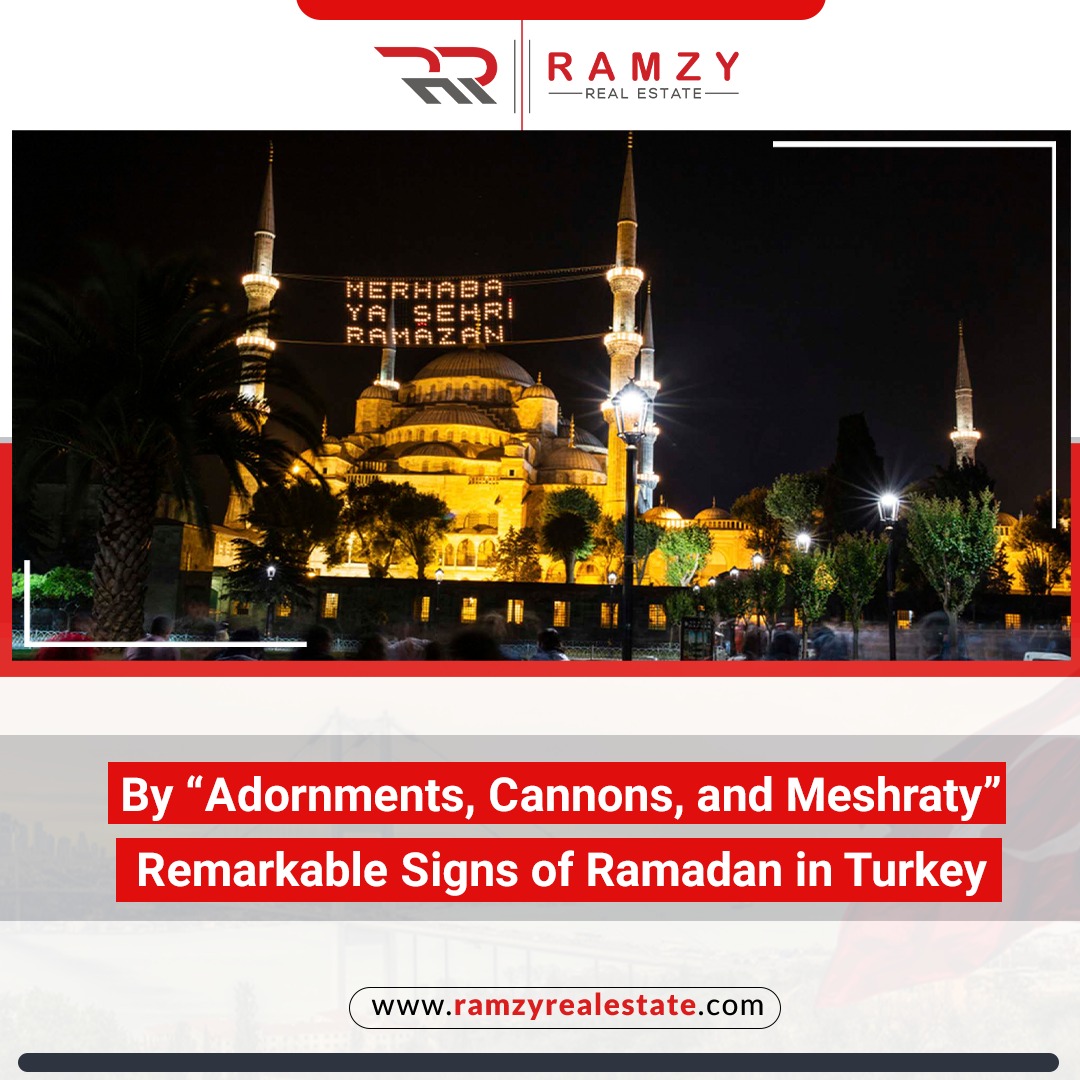By “adornments, cannon, and Mesahraty” remarkable signs of Ramadan in Turkey

Content Index
“Sultan of the months” this is the name that Turks titled Ramadan the holy month, because of its prestigious place among the Turks, indeed Turkey has unique customs and traditions in Ramadan, as Turk celebrate the month through inherited traditional manifestations that they perform to express their great respect to this month, this celebration reflects through lightening the streets, the decoration of mosques, and other aspects of receiving the holy month, and like other Islamic peoples, there are some customs related to Ramadan, not like the rest of the months, including customs related to foods and drinks, also the worship related to Ramadan, such as Tarawih prayers and night prayers. And reading the Qur’an, praying the Tahajud and other religious worship associated with this month.
1- Signs of reception
Decorating mosques: Turks receive Ramadan with ululating to express the joy of the arrival of the month, and they begin to decorate mosques with lights and banners bearing various religious phrases to welcome the holy month of Ramadan. The decoration that is inherited 450 years ago, also they decorate some homes, streets and alleys.
Ramadan banquets: as it titled “Rahman’s tables”, Many municipalities in Turkey begin to set up Ramadan tents in the squares, as iftar tables are spread in public places to provide free food to everyone who pass the time of breaking the fast outside his home, and many charities communities prepare free tables for the poos, and the municipalities of Istanbul and Ankara are the first Turkish municipalities that serve breakfast to fasting people in the streets and public squares.
Businessmen also and rich people in Turkey compete during the holy month to set up these tables as a type of zakat on their money and trade and to seek wages in this holy month. In addition to the Rahman’s tables, so many tents are set up to distribute charitable breakfast that provide thousands of daily breakfast meals for the poor.
Like other Islamic countries, the streets become very crowded with rushing people to buy all Ramadan foodstuffs to prepare banquets for their relatives and friends. You find markets such as the Egyptian market and the spices market in Istanbul come to life, as the Turks buy from there sweets and traditional foods that are served at breakfast tables, as olives and cheese, pastrami and dates are the foodstuffs that the Turks eat at breakfast.
2- Ramadan foods and drinks of the Turks
Bakeries produce pide bread, a type of bread specially produced in Ramadan, and serve it either with meat, cheese or eggs, and it is one of the main items on the Turkish table in Ramadan. Also, the nuts such as walnuts and pistachios.
The table of the Turks in Ramadan is filled with many appetizers that are placed on each table throughout the holy month. The Turks start their breakfast by eating dates and milk or olives, while the hot soup dish remains one of the basic foods in the Turkish table.
As for sweets, “Baklava” is on the top of Ramadan sweets, and it is prepared either with milk and is decorated with fruits and nuts. In Ramadan, people also buy “Awwama”, Qadha’if, Ashura sweets, Muhallabia, Turkish baklava, sweet delights, and other sweets that are still present in Ramadan, as well as kunafa and baklava. It is one of the most main sweets that Turks prefer in Ramadan.
As for drinks, the black berry "Kara Toot" is at the top of the list of Turkish drinks in Ramadan. It is made of 95% natural ingredients, brought from Anatolia and Hatay city in particular, to be filtered and squeezed in front of the eyes of fasting people.
The Turks also offer the Ottoman drink, or "Othmanli Sharbatly", a mixture of ingredients, like cloves, cranberries, grapes, dates, licorice and lemon.
They also serve tamarind drinks, rose syrup, lavender blossom, and kushburnu (bird's beak syrup), which looks like hibiscus, while ayran (milk syrup) enjoys a great place on the Turkish table in Ramadan in the rest of the days.
As for Sahur, the Turks eat a heavy meal so that they can spend the next fasting day, the cream is usually a main part of their meals, as well as pasta with cheese, eggs, Turkish sausage and chicken, along with tea that is prepared with each meal.
3- Al-Masaharati
One of the distinguishing signs of Ramadan in Turkey, the "dabugu" or Al-Masaharati, who roams the streets and alleys from midnight until before dawn every day, wearing his own costume as he sings with the beats of his drum to wake the inhabitants, and keeps calling for people to wake up for Sahur.
This tradition dates back to the Ottoman era, and what distinguishes it also is that children go out and celebrate behind Al-Masaharati and clap at the rhythm of the drum, although this phenomenon has become limited to the old areas of Istanbul as well as in countryside areas and other cities in Turkey, due to the presence of the alarm that shows the dates of Sahur and Iftar However, it is still present as one of the inherited customs of Turkish culture.
4- Ramadan cannon
In Turkey, the call of Maghrib prayer should be after the launch of the Iftar cannon, which is an Ottoman tradition followed in Turkey to announce the dates of Iftar and Imsak. The cannon is launched in more than one square in Turkish cities.
5- Reciting The Qur’an and Tarawih prayer
Tarawih prayer is one of the most important acts of worship that takes place after the evening prayer or “Ishaa”. The imams of mosques in Turkey perform 20 rak’ahs of Tarawih every night, as well as reciting the Qur’an or what is known as the “completion”, an inherited Ottoman tradition where readers who have beautiful voices recite part of The Holy Qur’an is recited loudly through the day in mosques in Ramadan, and the worshipers in the mosque continue their recitation secretly in the Qur’an, thus the reciter and everyone who listens to the Holy Qur’an complete reciting at the end of the month.
Also, Turks spend a lot of money on the poor and charity at this month, and they are keen to pray for the Prophet Muhammad, may God’s prayers and peace be upon him, at various times and between prayers.
Visiting the “Al-Kharafa Al-Sharifah” mosque is another famous custom of the Turks during Ramadan. Men and women all over Turkey are keen to visit the Al-Kharqa Al-Sharifah Mosque in Al-Fateh district in Istanbul; To see the honorable rag of the Prophet, which was transferred by Sultan Selim from Hejaz to Istanbul during his era of the Ottoman Empire.
6- Family visits
The families keen on visiting each other during Ramadan, as it is a part of the Turkish culture, in which food dishes are also exchanged among neighbors to strengthen social bonds and to create an atmosphere love between members of the same family, and between members of Turkish society.



